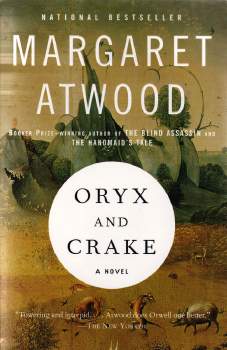 I am struck by the similarities between Margaret Atwood's Oryx and Crake and the last book I finished, The Island of Dr. Moreau: both are science fiction novels about the capability of science to give man control over nature and over himself. The Moreau figure of this book is Crake, a genius who believes that he can create a new human race from scratch that has been biologically manufactured to have none of the previous race's faults.
I am struck by the similarities between Margaret Atwood's Oryx and Crake and the last book I finished, The Island of Dr. Moreau: both are science fiction novels about the capability of science to give man control over nature and over himself. The Moreau figure of this book is Crake, a genius who believes that he can create a new human race from scratch that has been biologically manufactured to have none of the previous race's faults.Only time will tell if Oryx and Crake fails to stand the test of time (quite possibly it won't, given the rate of technological change we're experiencing today), but it has quite a bit to say about our world: The main character, Jimmy, lives in a world of enclosed "compounds" where troupes of scientists and other employees live closed off from the "pleeblands," the unpredictable and dangerous areas of the world that haven't been hermetically sealed. There are two plotlines, divided by a world catasatrophe that isn't explained until the end of the book: In one, Jimmy is an average kid growing up in the compounds; Crake is his only friend. In the other, Jimmy is now known as Snowman, a shriveled and miserable Omega man figure who watches over a strange race who dwell on the beach, the only other "humans" left in the world. We later find out that these are the creations of Crake, who has designed both the destruction of the old human race and the generation of the new.
You can see our world in Atwood's: the way that Jimmy and Crake learn about the world is through the internet, which is their portal to live executions, beheadings, macabre computer games, and child pornography. Through the latter Jimmy first meets a girl named Oryx, an Asian sex-worker who later becomes his lover. I think perhaps one of the most interesting themes in Oryx and Crake is the commodification of life: not so much that it is brought about by rampant commercialism and globalization; those ideas are old, but also by science, which is draining all of the mystery from human life. The "Crakers" live peaceably with each other, but Crake has engineered them without art, without religion, without imagination. Is this a life worth living? Is it even a human life? Oryx and Crake may seem antiquated in twenty years time, but the question of what it means to be human--like in The Island of Dr. Moreau--is one that never grows old.
I love Atwood's style; it rolls so fluidly and no word seems out of place. However, the plot is thin in places, especially when it comes to the character of Oryx, who is in the title but never really seems to be fleshed out like Jimmy/Snowman or Crake. Atwood suggests that part of Crake's decision to wipe out humanity is motivated by jealousy over Jimmy's relationship with Oryx, but she never pauses to explain the connection between these two elements. As a result, the questions that Atwood wants to present us with--to what extent is Crake responding to what he sees as weaknesses in himself, does removing the brain functions that produce lust in the Crakers make them superior creatures--become watered down. But otherwise, I recommend this book highly.

3 comments:
Did you read this for a class?
Yes. The same class.
[url=http://kfarbair.com][img]http://www.kfarbair.com/_images/_photos/photo_big8.jpg[/img][/url]
בית מלון [url=http://www.kfarbair.com]כפר בעיר[/url] - אווירה כפרית, [url=http://www.kfarbair.com/about.html]חדרים[/url] מרווחים, שירות חדרים, אינטימיות, שלווה, [url=http://kfarbair.com/services.html]שקט[/url] . אנו מספקים שירותי אירוח מיוחדים כמו כן ישנו במקום שירות חדרים הכולל [url=http://www.kfarbair.com/eng/index.html]סעודות רומנטיות[/url] במחירים מיוחדים אשר יוגשו ישירות לחדרכם!
לפרטים נוספים אנא גשו לעמוד המלון - [url=http://kfarbair.com]כפר בעיר[/url] [url=http://www.kfarbair.com/contact.html][img]http://www.kfarbair.com/_images/apixel.gif[/img][/url]
Post a Comment